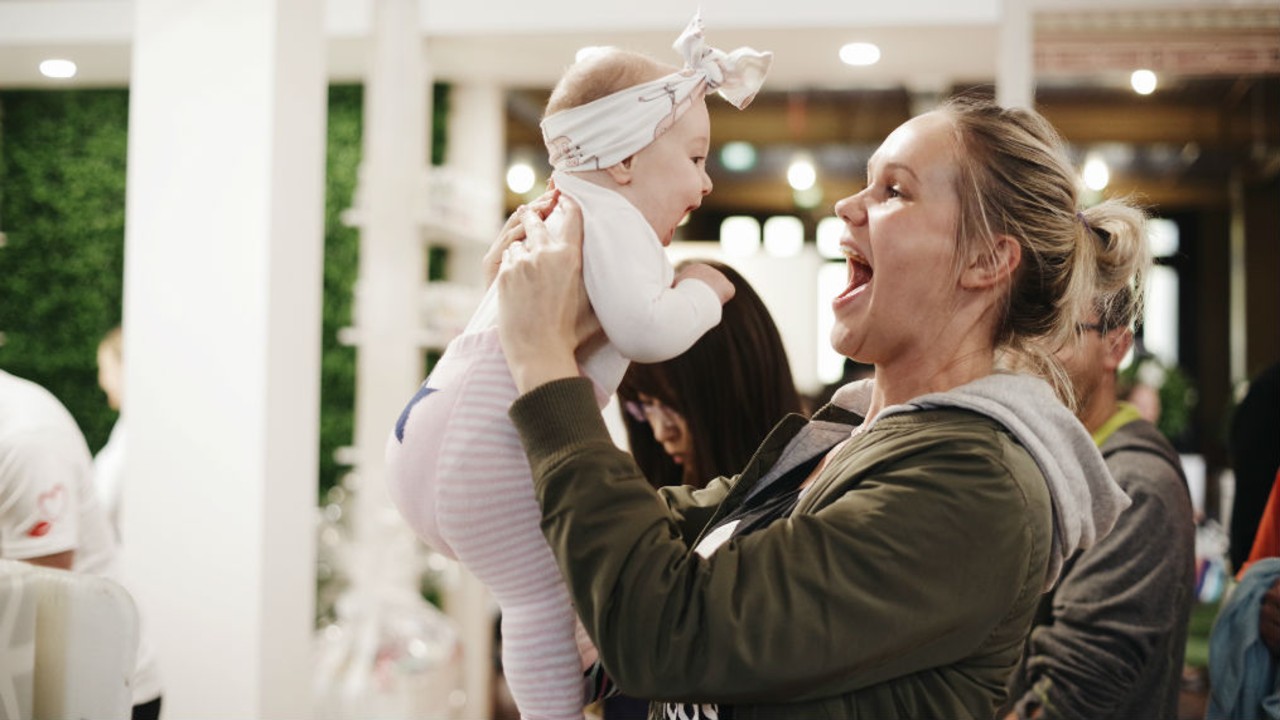Postpartum mood and anxiety disorders can affect anyone at any time, but with help, it’s never too late to find yourself again.
By Nicole Fuge, MD® Managing Editor
Like most new mothers, Paige Bellenbaum was completely out of her depth when she had her son, Max, 14 years ago.
She didn’t know what was ‘normal’ and what was not, so she assumed this was MOTHERHOOD.
And she was miserable.
As a trained social worker, Paige was well versed in recognising mental illness in others, but when it happened to her, she was blindsided.
It wasn’t until her symptoms became more debilitating that she realised this actually wasn’t the norm.
“I was incredibly anxious, I was convinced there was something awful going on inside me, that something I ate or did was going to have a negative impact on the development of my son. I was calling my midwife multiple times a week asking if things were normal or not normal. At the time I didn’t think much of it, I thought that was what it was to be pregnant for the first time,” she says.
After a long and painful natural birth, Max was put on her chest – a moment many mothers soak in – but Paige was emotionally void.
“A lot of people talk about that moment of unconditional love, that this is the best thing that’s ever happened. For me, I wanted him off me, I wanted to go into a dark room and cry and sleep for three days and eat a burger. That’s all I could think about.”
“MY POSTPARTUM DEPRESSION STARTED VERY QUICKLY AFTER MY SON WAS BORN. NOW THAT I THINK ABOUT IT, I HAD SYMPTOMS DURING MY PREGNANCY THAT I DIDN’T RECOGNISE OR KNOW.”

Once home, Paige’s anxiety peaked
Paige worried about and had an impending sense of doom that Max was going to die, whether it be from sleeping too much, not sleeping enough, not eating enough. Anxiety riddled her family’s life, and then it quickly shifted to depression.
“It was hard to get out of bed in the morning, I couldn’t sleep when my son was sleeping or being looked after or cared for, I was up every second checking he was still breathing, and when I tried to fall asleep I had racing thoughts going through my head I couldn’t turn off,” she says.
“My depression rendered me unable to make a decision, unable to complete daily tasks, take a shower, go outside, I was completely paralysed. I felt completely overwhelmed by my son.
“The only way he would sleep was in a sling on my lap, so I spent the majority of my day sitting on the sofa, staring at the wall, feeling miserable and wanting to escape. I wanted to get away from him so I didn’t have to be stuck in this mundane situation with a little person that I not only did not like but I was petrified of.
“I didn’t get treatment. And I didn’t tell anyone how bad it was because I was afraid I would be judged. I was afraid of the stigma and shame that was embedded in the way I was experiencing motherhood – a way I wasn’t supposed to be. I didn’t think anyone else was feeling this way. It was like I was the only one on the planet.”

The turning point
This went on for six months and culminated when Paige finally pulled herself together and went for a walk with Max in the stroller.
“We were walking down the street and I didn’t feel anything. It was summer and the sun was out and it was hot, but everything was a cloud of greyness.
“As I walked along, I saw this bus coming out of the corner of my eye, and as it got closer I had this overwhelming feeling that I should throw myself and my son in front of the bus, because clearly there was no reason for me to exist, and it was a detriment for him to be alive with a mother who was so incapable of looking after him and loving him,” she says.
“For whatever reason, despite every bone in my body wanting to do that, I didn’t. Instead, I watched the bus go by and I caught a glimpse of myself in the window and the person I saw was unrecognisable. I didn’t know her but she sure looked like somebody who needed help.”

“I need help”
Paige went to the only place in New York City offering specialised treatment in perinatal mood and anxiety disorders (PMADs) and got the treatment she needed. She went on medication and went into therapy and slowly started to feel better.
“Over time I started to love my son unconditionally. I started to enjoy him, I started to feel connected and feel that bond. I started to experience what we want motherhood to feel like.”
Drawing on her background in public policy and her experience as a social worker, Paige then looked into what was available to new and expecting mums in ways of education, screening and treatment across the United States – because no other mother should feel the way she felt.
Paige drafted legislation to make screening and education of PMADs mandatory in the state of New York, which was championed by Senator Liz Krueger.
And in 2014, the bill was signed into law, making screening strongly encouraged and education mandatory.
At the same time, Paige was also educating women on PMADs and organising community events, which is where she met Dr Catherine Birndorf, a leading psychiatrist.

The birth of The Motherhood Center
Paige worked with Dr Birndorf, who had loads of experience treating women with PMADs, and they opened The Motherhood Center of New York in 2017, along with another co-founder.
What started as a small number of pregnant and postpartum women through their doors has since turned into helping thousands of women with mild to severe symptoms.
“PMADs is the umbrella term to capture a number of diagnoses – depression, anxiety, obsessive compulsive disorder, post traumatic stress disorder, bipolar disorder and in rare instances, psychosis,” Paige says, explaining that 50 per cent of all PMADs originate in pregnancy.
The stats show that one in five women experience a PMAD, but Paige says it’s more like one in three, especially in a pandemic.
“We have seen an enormous increase in women struggling with anxiety and depression [during COVID-19] and the numbers under-represented because of stigma and shame. Women fear being judged, being seen as a failure or having their baby taken away.”

Help is available
The Motherhood Center runs support groups for expecting and new mums, and their partners. They also offer outpatient treatment and therapy, and are known for their day program, which is a partial hospitalisation program for women with very acute symptoms who are having a particularly hard time caring for themselves and/or their babies.
It’s a step between outpatient and inpatient, with an onsite nursery where mums can leave their babies and spend time working on themselves.
“Group therapy is a miracle; it’s probably the most effective medicine. Women are around other women just like them who are also struggling, sharing their stories and normalising the difficulties in the transition to motherhood. This makes it easier for them to be open and honest, and feel safe about what they’re thinking and feeling,” Paige says.
Due to COVID-19, the Motherhood Center has moved all offerings onto a virtual platform, which has allowed mums from all over the world, including Australia, Japan and the Netherlands, to now join their support groups. And with three of the four risk factors for PMADs now the ‘new norm’ – isolation, lack of social support and managing high levels of stress and anxiety – more mothers are at risk.

Anxiety and depression rates are higher than ever
“Women are grappling to come to terms with a whole new sense of normal while they’re pregnant, during delivery and when they bring their baby home. They aren’t having access to the components of care they thought would be there. Whether that be their parents. Hiring a nanny. Or putting their child in daycare,” Paige says.
“And health anxiety is the number one manifestation of anxiety for a new mum. So you can only imagine how that is intensified when we have an international pandemic going on.”
Because PMADs don’t discriminate, no one is immune, so it’s important to look out for the signs.
But often due to the fear, stigma and shame attached to PMADs (and the pressure to show to the world that we are okay) many mothers hide their symptoms.
Some may not even notice it’s happening to them, and others are silently crying out for help.
“When you’re a new or expecting mum experiencing mild to severe symptoms, it’s really hard to notice what’s happening to yourself. And if it’s so severe, you feel paralysed to do anything, let alone help ourselves.
“The sheer thought of finding and calling a doctor feels like the most overwhelming task. So we suffer silently and wait for someone to throw us a life preserver.
“That’s why it’s critically important for partners and family members to be in tune to and recognise what PMAD symptoms look like. Because when you’re that mum, you don’t have the energy. The forethought. The hindsight. The energy. You have no ability to ask for help, or to know what’s going on. Or to even begin to know what to do about it,” Paige says.

You are not alone and it’s not your fault
So mama, if you’re pregnant or in the postpartum period. And you feel like you’re struggling. Like you’re failing. Like you want to escape. That it’s never going to change. And you’re always going to feel this way, know this – IT’S NOT YOUR FAULT.
“You didn’t do anything wrong,” Paige reassures.
“Poor mental health and mental illness is not something we ask for, it’s something that happens to us. It also doesn’t define us.
“Depression doesn’t mean that we depression, it means we’re experiencing depression. We’re still us, we’re still who we were before. Once we treat it, we go back to the way we used to be.
“Women feel this enormous amount of shame, but PMADs are super treatable. We know what works, so if anyone is silently struggling, get help as soon as you’re feeling something is wrong. Get the answer.
“Because the sooner you get the answer, the sooner you’ll feel better.”

PMAD symptoms to watch for
Constant anxiety
Your mind is a hamster wheel. You’re catastrophising and thinking the worst-case scenario is always going to happen. You operate with an impending sense of doom. And feel like harm is going to come to either your baby or yourself.
Scary thoughts
They might be grotesque in nature, about harm coming to the baby. And quite often we’re the ones causing the harm. Around 80 per cent of all new mothers experience intrusive thoughts. But we don’t talk about them. Because we’re petrified that not only are we going to have our baby taken away, but we might spend time away ourselves. There’s not enough education and normalcy, so many women keep those thoughts to themselves.
Other red flags
- Your eating and sleeping is impaired
- You’re not able to complete daily tasks.
- Not enjoying things you used to enjoy.
- Having difficulty making decisions.
- You’re not connecting with your baby.
- You are feeling as though you made a mistake. And like you want to give the baby away. Or want to run away and escape.
- You’re having a hard time getting up in the morning.
- You are losing interest in reaching out to family and friends.
- You’re becoming very isolated and introverted, crying a lot, feeling irritable and angry.
- In serious cases, you are wanting to end your own life because you’re so miserable and unhappy.
For further information or support head to The Motherhood Center, Cope, PANDA or Beyond Blue, or speak to your GP for help.
Sign up to our newsletter for weekly mama goodness delivered straight to your inbox, like the VIP that you are.





